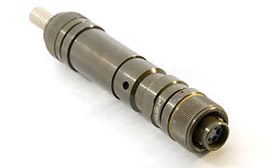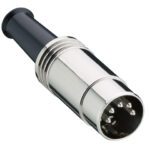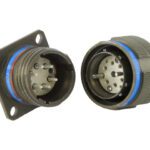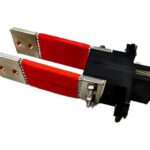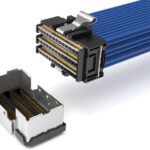What are MIL-PRF-28876 connectors?
Meet the Connector: MIL-PRF-28876 connectors
MIL-PRF-28876 connectors, also known as M28876s, are military standard fiber optic circular connectors used in rugged naval applications where reliability, sealing, durability, and a secure latch are essential to performance in harsh environment conditions. They are widely used by the U.S. Navy and Allied forces for shipboard technologies. The MIL-PRF-28876 features an aluminum alloy body and has double start threads for a secure connection in harsh environments. It includes a MIL-T-29504 style optical terminus. The MIL-PRF-28876 is available in plug, wall-mount receptacles, and jam-nut mounted receptacles in a full range of standard insert arrangements.
The NavAir and NavSea organizations led the effort to develop specifications for optical interconnect solutions for the military and released the MIL-PRF-28876 fiber optic standard in 1983. The connector and its optical contacts were designed to pass MIL-STD-901, grade A, class I, which addresses the high intensity shock requirements experienced in combat conditions by naval vessels. The original M28876 specification indicates cadmium plating as the protective surface finish to withstand humidity, corrosion, salt spray, particulates, and other naval equipment operating conditions. Following the release of the RoHS, the MIL-PRF-28876 Revision F replaced cadmium with black hard anodized PTFE (BHA-PTFE) and tin-zinc (SnZn) plating. The new finishes are not only safer than cadmium, they outperform the material in environmental and performance tests.
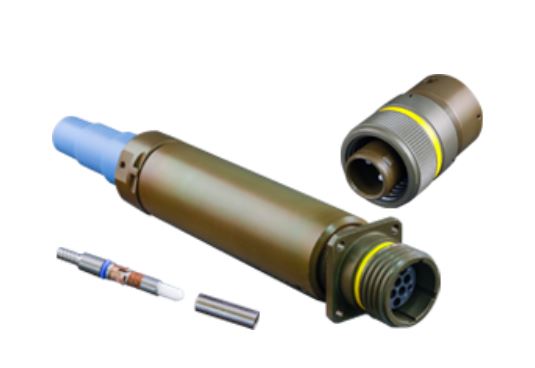
Glenair’s MIL-STD-28876 connector, available from Mouser Electronics
Design Notes
Standardization The MIL-STD-28876 connector is standardized by the U.S. government and is included in the QPL.
Sealing Fluid resistance per MIL-STD-1344, Method 1016; IP67 sealing can be achieved with the use of a compatible waterproof mounting gasket.
Crush Resistance 225 pounds per MIL-STD-1344, Method 2008.1
Impedance 50 Ohm
Frequency Range DC to 40 GHz
Dielectric Withstanding Voltage 500 Vrms at sea level
Operating Temperature Range -54°C to +65°C
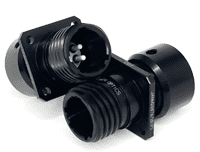
Amphenol Fiber Systems International 28876 connectors available from ICC
Durability 500 cycles per EIA-455-21
Vibration Per MIL-STD-1344, Method 2005, Condition II & VI
Mechanical shock Per MIL-S-901, Grade A
Thermal cycling -62°C to +70°C per MIL-STD-1344, Method 1003
Corrosion Resistance 500-hour salt spray per MIL-STD-1344, Method 1001
Ozone Exposure 150 PPM/2 hours per MIL-STD-1344, Method 1007
Humidity 240 hours per MIL-STD-1344, Method 1002
Modes Singlemode and multimode capability
Terminus Retention Force 22 pounds minimum per MIL-STD-1344, Method 2007
Insert Retention Axial 100 PSI minimum per MIL-STD-1344, Method 2010
Flammability Per MIL-STD-1344, Method 1012
COTS Equivalents Commercial-Off-the-Shelf products are available that maintain key performance factors of the MIL-Spec versions.
Markets, Sectors, and Applications
Navy shipboard applications and ship-to-shore data transmissions; other military and aerospace (land tactical/field-deployed ground military, ground and airborne radars, missile defense systems, military and commercial avionics and displays, UAV and tethered drone, IFE&C); mining, oil & seismic; industrial fiber optic systems; wireless and broadband; medical
Suppliers
Heilind Electronics, ICC (Interstate Connecting Components), Mouser Electronics, Powell Electronics, Timbercon (Radiall), TTI Inc.
Related products:
- Optical fiber connector
- MIL-T-29504 Termini
Like this article? Check out our other Meet the Connector, Harsh Environment, and our Military/Aerospace Industry Page, and our 2022 Article Archive.
Subscribe to our weekly e-newsletters, follow us on LinkedIn, Twitter, and Facebook, and check out our eBook archives for more applicable, expert-informed connectivity content.
- Meet the Connector: DIN Standard Connectors - April 16, 2024
- Software-Driven Radio Reinvigorates Old Technology - April 9, 2024
- What is a Busbar? - April 2, 2024
